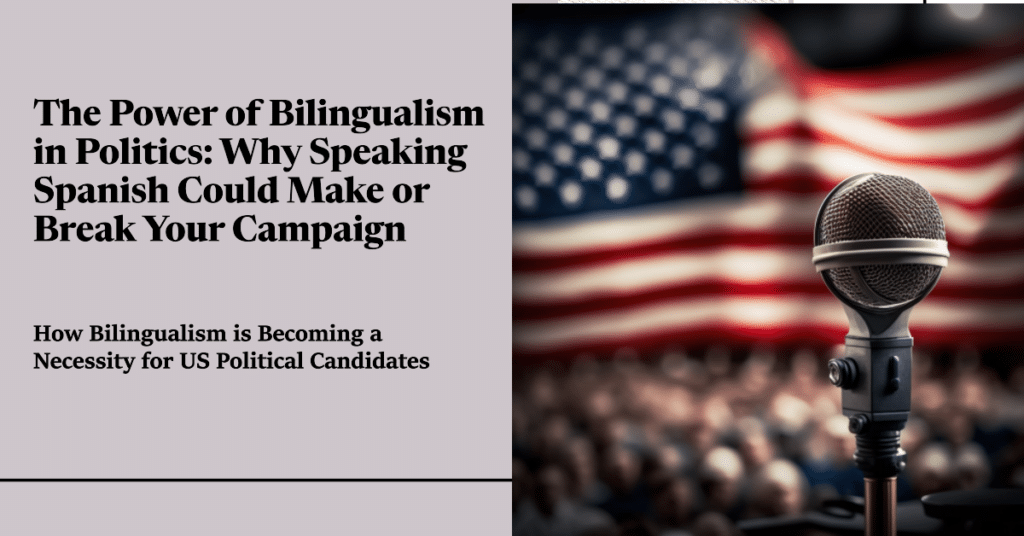
In a country where Spanish is the second most spoken language and the Hispanic population is rapidly growing, bilingualism is becoming a necessity for political candidates. But how can they navigate this linguistic challenge? This article explores the different models of bilingual education in Canada and the US, the political debates and controversies over bilingualism, and the challenges and opportunities of bilingualism in politics. Successful bilingual politicians, such as Justin Trudeau and Barack Obama, have used their language skills to connect with diverse audiences and address global issues. Will future US presidents need to be fluent in Spanish? The answer may surprise you.
The Power of Bilingualism in Politics: Why Speaking Spanish Could Make or Break Your Presidential Campaign
Imagine you are running for president of the United States. You have a strong platform, a loyal base, and a charismatic personality. But there is one thing that could make or break your chances of winning: your ability to speak Spanish. Why? Because Spanish is the second most spoken language in the US, after English, and the number of Hispanic voters is growing rapidly. According to the Pew Research Center, Hispanics will account for 29% of the electorate by 2050, up from 13% in 2020. If you want to reach this influential group of voters, you need to speak their language. Literally.
But speaking Spanish is not only a political strategy. It is also a sign of respect, inclusion, and diversity. It shows that you care about the culture and identity of millions of Americans who speak Spanish at home, at work, or at school. It also shows that you are open to learning from other perspectives and experiences. And it may even give you an edge in dealing with global issues that require bilingual communication and diplomacy.
This is not a hypothetical scenario. This is the reality of bilingualism in politics in the US today. And it is not a new phenomenon. Bilingualism has been a contentious issue in Canadian politics for decades, with French being the official language in Quebec and English being the primary language in the rest of the country. How have Canadian politicians dealt with this linguistic challenge? And what can US politicians learn from them?
In this article, we will explore the different models of bilingual education in Canada and the US, the political debates and controversies over bilingualism, and the challenges and opportunities of bilingualism in politics. We will argue that bilingualism is not only a necessity but also a choice for political candidates who want to succeed in the 21st century.

Bilingualism in Politics: Necessity or Choice?
Bilingualism has been a contentious issue in Canadian politics for decades, with French being the official language in Quebec and English being the primary language in the rest of the country. However, with the changing demographics of the United States, there is now a growing need for political candidates to be competent in Spanish. This article will explore the different models of bilingual education in Canada and the US, the political debates and controversies over bilingualism, and the challenges and opportunities of bilingualism in politics.
The Different Models of Bilingual Education
Bilingual education in Canada and the US can be divided into four models: immersion, transitional, maintenance, and dual language programs. Immersion programs are the most common in Canada, where students are taught in a second language for a minimum of 50% of the school day. In the US, transitional programs are more common, where students receive instruction in their native language and gradually transition to English. Maintenance programs focus on maintaining and developing the student’s first language and introducing a second language, while dual language programs teach students in two languages with the goal of bilingualism and biculturalism.
Academic outcomes and language proficiency of students in bilingual education programs vary depending on the model used. Immersion programs have been found to be effective in developing language proficiency, but may negatively impact academic outcomes in subjects taught in the second language. Transitional programs can be effective for English language acquisition, but may not promote bilingualism. Maintenance and dual language programs can maintain and develop the student’s first language while introducing a second language, promoting bilingualism, and may enhance academic outcomes.
Political Debates and Controversies
The political debates and controversies over bilingual education in both countries revolve around official bilingualism, language rights, assimilation, multiculturalism, and national identity. In Canada, the Official Languages Act of 1969 established English and French as the official languages of the federal government and mandated bilingualism in federal institutions. This has led to debates over the costs and benefits of official bilingualism, the rights of linguistic minorities, the assimilation of immigrants, the promotion of multiculturalism, and the maintenance of national identity.
In the US, there is no official language, but English is the dominant language in government and commerce. This has led to debates over language rights, the assimilation of immigrants, the promotion of multiculturalism, and the maintenance of national identity. Some states have passed laws making English the official language, while others have mandated bilingual education programs. The debate over bilingual education intensified in the 1990s, with the passage of Proposition 227 in California, which abolished bilingual education programs in favor of English immersion.
Successful Bilingual Politicians
There are many successful bilingual politicians in both Canada and the US who have used their language skills to connect with diverse audiences and address global issues. Justin Trudeau, the current Prime Minister of Canada, is fluent in English and French, which has helped him connect with voters in Quebec and promote bilingualism in Canada. Barack Obama, the former President of the US, is proficient in English and Indonesian, which has helped him connect with the Muslim world and promote multilingualism in the US.
Challenges and Opportunities of Bilingualism in Politics
The challenges and opportunities of bilingualism in politics include the potential for miscommunication, stereotyping, tokenism, or pandering, as well as the benefits of cross-cultural understanding, diplomacy, and representation. Bilingual politicians must be careful not to stereotype or pander to linguistic minorities, but rather to connect with them on a human level and address their concerns. Bilingualism can enhance cross-cultural understanding, which is essential for diplomacy and representation in a globalized world.
How 24 Hour Translation Services Can Help You Navigate Bilingualism in Politics
At 24 Hour Translation Services, we understand the importance of bilingualism in today’s multicultural societies, especially in the realm of politics. As the article highlights, the ability to speak a second language is becoming increasingly necessary for politicians to connect with diverse audiences and address global issues.
We offer professional translation and interpretation services for individuals and organizations seeking to bridge the language gap and communicate effectively in multilingual settings. Our team of experienced linguists can provide accurate and culturally-sensitive translations for a variety of documents, including political speeches, campaign materials, and legal documents.
Whether you are running for political office or seeking to expand your business in a culturally diverse market, we can help you achieve your goals with our language services. Contact us today to learn more about how we can help you navigate the challenges and opportunities of bilingualism in politics and beyond.
Conclusion
Bilingualism in politics can be seen as both a necessity and a choice, depending on the political context and demographic makeup of the country. In Canada, bilingualism is a political imperative for leaders who are serious about national leadership, whereas in the US, it is becoming increasingly important for politicians to be competent in Spanish due to the growing Hispanic population. Bilingual education programs also play a significant role in promoting bilingualism and multiculturalism, and their effectiveness varies depending on the model used.
The debate over bilingualism in politics will likely continue in both Canada and the US, with arguments for and against official bilingualism, language rights, assimilation, multiculturalism, and national identity. Successful bilingual politicians can use their language skills to connect with diverse audiences and promote cross-cultural understanding, but must be careful not to stereotype or pander to linguistic minorities.
As the world becomes more interconnected, bilingualism and multilingualism will become increasingly important for political leaders to navigate global issues and promote inclusiveness. The challenge for political leaders is to embrace bilingualism as a tool for communication and understanding, rather than a source of division and conflict.
Frequently Asked Questions
Being bilingual can open up job opportunities in various fields such as international business, translation, interpretation, and diplomacy.
Learning a second language can improve cognitive skills, academic performance, and social skills in children. It can also enhance their cultural awareness and understanding.
The Official Languages Act is a Canadian law that mandates bilingualism in federal institutions and recognizes English and French as the official languages of the federal government.
Multiculturalism refers to the coexistence of different cultures, ethnic groups, and languages in a society, often with an emphasis on the recognition and celebration of diversity.
Social and political factors can influence the availability of language education, the status of different languages, and the attitudes towards language learning and diversity.
Bilingual politicians may face challenges such as miscommunication, stereotyping, tokenism, or pandering, as well as resistance from monolingual voters or opposition to official bilingualism policies.
The United States’ history as a melting pot has led to a diverse range of languages and cultures, which can impact language proficiency levels in different regions and communities.
Being bilingual can help individuals communicate and understand different cultures, perspectives, and experiences, which is essential for cross-cultural understanding and diplomacy.
Bilingualism can help preserve and promote minority cultures and indigenous languages, which may be at risk of extinction or marginalization.
Some examples of successful bilingual politicians in the United States include former President Barack Obama, who is proficient in English and Indonesian, and Senator Marco Rubio, who is fluent in English and Spanish.
Bilingual education programs can promote multiculturalism by introducing students to different languages and cultures, enhancing their cultural awareness and appreciation, and promoting social cohesion and diversity.
Being bilingual can help African Americans in the United States to connect with their cultural heritage and ancestral languages, as well as to communicate with Spanish-speaking communities and participate in global conversations.
The different models of bilingual education in the United States include immersion, transitional, maintenance, and dual language programs, which vary in their focus on language proficiency and academic outcomes.
Political philosophy can influence the attitudes towards language learning, diversity, and identity, as well as the policies and practices related to bilingualism and multiculturalism.
Multicultural societies can benefit from promoting bilingualism by fostering cross-cultural understanding, social cohesion, and economic opportunities, as well as by recognizing and valuing linguistic diversity.
